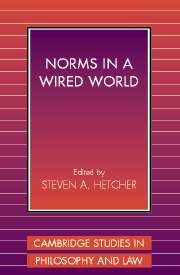Book contents
3 - Norm Utilitarianism
Published online by Cambridge University Press: 05 June 2012
Summary
It looks as if a working moral code must comprise a set of specific directives like, ‘No cigar smoking!’ These directives might not guide people to do exactly what ideally anyone would like them to do, but they are the best that can be done by the instrument of a moral code.
Richard BrandtIntroduction
The connection between utilitarianism and the rational actor account of norms developed in the chapter is deep and fundamental. Utilitarianism has a completely instrumental theory of right action. Right action is simply that which maximizes the good. The utilitarian should take note of the fact that there are three structures of norms. Rational actors' conformity to these norms is evidence of their welfare-producing capabilities.
In general, utilitarians have paid little attention to the theory of norms. The discussion in Chapter One suggests a possible explanation. Utilitarians, like the social theorists discussed in Chapter One, have been distracted from a proper examination of norms by their focus on rule-based accounts. This chapter will examine the role that norms should properly play in utilitarianism, and more generally in any critical normative approach to law that gives a prominent role to weighing consequences.
Norms Versus Rules in Utilitarian Theory
For the utilitarian, the fundamental question for practical ethics is how best to maximize utility. Rules have been the answer most often given by utilitarians. The utility-maximizing society will be the one built on the best set of moral and social rules. I will argue that this is incorrect. Rather, the society that incorporates the best set of norms will be the utility-maximizing society.
- Type
- Chapter
- Information
- Norms in a Wired World , pp. 79 - 95Publisher: Cambridge University PressPrint publication year: 2004

